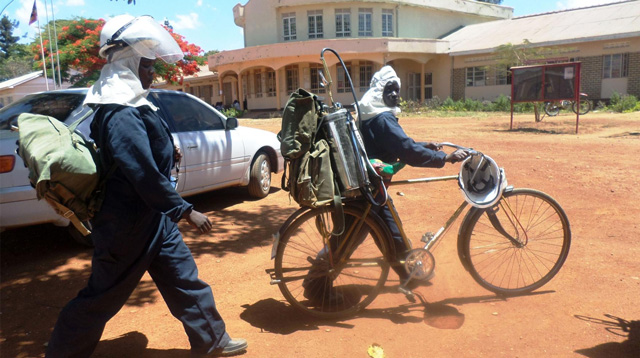
Serere, Uganda | THE INDEPENDENT | Serere district is set to start the second phase of Indoor Residual Spraying in another intervention to eradicate malaria, the leading cause of morbidity and mortality in Uganda.
The spraying exercise is part of a five-year USAID-funded project in several districts of Eastern Uganda. It will involve the use of Fludora-Fusion, a new vector control solution that was recently prequalified by the World Health Organisation, after being tested against more than a dozen of resistant mosquito strains in Sub-Saharan Africa. The exercise will last 24 days, effective April 26.
It is hoped that the exercise will relieve the district of the disease which continues to have a devastating impact on families and communities – particularly in Sub-Saharan Africa. It accounts for 30 – 50 per cent of outpatient visits and 15 – 20 per cent of hospital admissions and up to 20 per cent of all hospital deaths.
The Serere District Health Educator Ambrose Okalany says that the district was chosen to benefit from the project because it lies in the peninsula of the waters of Lake Kyoga, where mosquito breeding is very high and places a high malaria burden on the community.
Francis Odeke, the Serere District Health Officer-DHO says that they chose to spray the houses during the month of April because of the rainy season when mosquitos are expected to multiply in large numbers, and when the district experiences a surge in malaria cases.
Tadeo Oonyu, the Principal Health Inspector of Serere says that the chemical lasts between 6-9 months while repelling and killing mosquitos that usually lay on the walls and verandas. Oonyu says the health teams will always return to spray the houses once they realize the increase of malaria cases when the period for the activeness of the chemical reaches.
He however says that each sub-county is coming up with an action plan to deal with any incidences of malaria after the end of the USAID project in 2022.
Meanwhile, health experts are encouraging families to continue using the recently distributed long-lasting insecticide-treated nets to stop both nuisance and malaria-causing mosquitoes. Oonyu says spraying is done to enhance other interventions like sleeping under mosquito nets, and the management of the environment around homes.
*******
URN
 The Independent Uganda: You get the Truth we Pay the Price
The Independent Uganda: You get the Truth we Pay the Price



